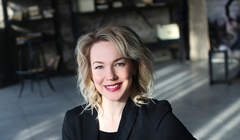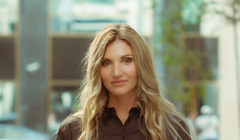
This year, the EHL Hospitality Business School, with campuses in Switzerland and Singapore, is marking its 130th year. Kommersant UK has talked to people with a range of perspectives on this unique training establishment. We heard about why it opens up such wide horizons for its graduates. In turn, we talked to a student of the school, one of its graduates who is now the manager of Beau Rivage Palace Hotel, a teacher from the school, and our head editor, who has been to its campus in Lausanne.
A student’s tale

Anastasia is a recent graduate of the EHL. She specialised in the financial management of restaurant service. Her parents are involved in the hotel business in Spain, which is why the choice of educational establishment was obvious for this lively, sociable girl.
In Anastasia’s words, getting accepted wasn’t easy; you have to prepare a serious essay and go through an interview (in English). The selection commission looks favourably upon multilingual applicants; the more languages they know, the better, so knowledge of Spanish and Russian helped her.
Study at EHL lasts for four years. The first year is preparatory, during which the students learn professions in the sphere of services; they try the roles of barista, bartender, waiter, room attendant and cleaner. Each group consists of 20 students. Working in small teams, trainees fulfil various duties in specially equipped areas on school premises. They serve other students and teachers. Anastasia admits that this can be quite exhausting; sometimes she has to work from six in the morning to ten at night, admittedly with small breaks. At the same time, there are very high standards to maintain. If, for example, you have a scruffy appearance with an unironed shirt, you’ll be sent back and fined; points will be deducted from your grades. ‘The teachers assess our work on various parameters, including our ability to work in a team. Overall, teamwork is very important here, that’s why, from the very first semester, we don’t get to choose who we work with. Everything is as close to life as possible. Conflicts do occur, of course, but you learn to overcome them’, Anastasia tells us.
In all, more than 3,000 people study at the school, with roughly equal numbers of boys and girls; the school tries to maintain a gender balance. From the second to the fourth year of study, academic subjects appear on the students’ timetables. Each semester, exams must be passed in these (the dropout rate is quite high). Over this period, two work placements must be done. The first is at the end of the preparatory year. The student can choose to work in either a hotel or a restaurant for six months. For example, Anastasia worked on the reception of a Spanish hotel. She did her second placement, which was also for six months, in Lausanne, at the Swiss offices of Philip Morris. There are many financial modules in the study programme; macroeconomics, microeconomics, accountancy, finance and real estate. This is so that graduates have a good financial background as well as their other skills. This opens many doors for them.
In the final year, students prepare a joint business project. ‘Incidentally, you can choose your team yourself in the third and fourth years. Many companies contact the university proposing their projects, and as a team, we decide which of them we’d most like to work on. Then, the university assigns each team to a company. We worked as consultants for a large business’, said Anastasia.
A few months before the end of the following academic year, students choose a specialised area. There are 25 of them in all, from marketing and finance to management and economics in the sphere of winemaking. Modules can be mixed.
At EHL there are 28 different committees for extracurricular activities, so everyone can find a hobby to their taste, from rugby and tennis to playing musical instruments. Also, psychologists and nurses work on campus, so students can always go to them if some kind of medical problem comes up. There are dry cleaners too. It’s actually a small town with everything you need in life, as the students spend their entire four-year study period here, with the exception of work placements and the winter, easter and summer holidays, the latter being the longest.
‘Over the course of my studies, my outlook on the future has changed. While previously I had thought I would go into the hotel business, now I have discovered new possibilities such as branding and restaurant concept development, among other things. This school is an excellent place to help you understand what you want to do in life’ Anastasia believes.
The school actively helps graduates to find employment, starting with internships. They have their own platform on which over 5,000 companies are registered and 700 vacancies are always available.

The teacher’s view

Having graduated from Saint Petersburg State University of Economics and Finance (SPbSUE), Natalia Bosvover worked as a consultant in the restaurant business before coming to EHL in September 2021. She teaches the financial management of restaurant service. It wasn’t difficult for her to capture the attention of her students as she is used to heading teams with several dozen members. ‘I like how the teaching staff is selected here; everyone has completely different experiences and views on life, there are theorists, as well as specialists in specific industries. This is interesting both for the people who work here and the students. Seeing different personalities, styles and approaches helps me to avoid getting stuck in a rut’, Natalia remarks. Before teachers first meet their students, EHL holds special workshops for them and also calls in more experienced colleagues, who show them the ropes and explain the intricacies of teaching at this unique school. ‘If you compare the Russian education system with EHL’s methods, there is a fundamentally different approach; everything is focused on practical application in the modern world. Students receive a knowledge set that will really help them to work in the industry later on’, says Natalia. ‘Many of our alumni go on not only to work in the hospitality sector, but also in other areas, such as banking. After graduation, only a small proportion works in the hotel or restaurant sectors themselves; the others work in a wide range of industries, from finance to retail. I teach them a model, taken from the example or the restaurant business, but this formula can be used for any other business too.
Although a decent grasp of mathematics is required to study these subjects, Natalia believes that even humanities-leaning first-years can prepare themselves to study them. It’s possible to catch up on maths skills by taking extra lessons.
‘There’s a whole range of reasons why, if I’d had the chance, I would have preferred to study here when I was younger’ says Natalia. ‘First of all, Switzerland is a wonderful country with a high standard of living and quality of life. Secondly, it’s safe, which is important for parents who are planning to send their children here. Thirdly, you really have to study here; they expel students with poor grades. In short, the study process is organised perfectly, allowing the official professional and academic aspects of the course to be combined with well-organised leisure activities. Fourthly, it’s conveniently accessible by public transport. Everything is nearby, including Geneva airport, from where there are regular flights to London, which is why on Friday, after classes, students can just pop home for the weekend. Fifthly, it’s not required for the students to know French, which is the language of the local canton. (Although, why not learn it anyway?). Everything that they need for life is on campus. Last, but not least, is the tolerance. In Lausanne, you can speak in any language and no one will eye you suspiciously’.
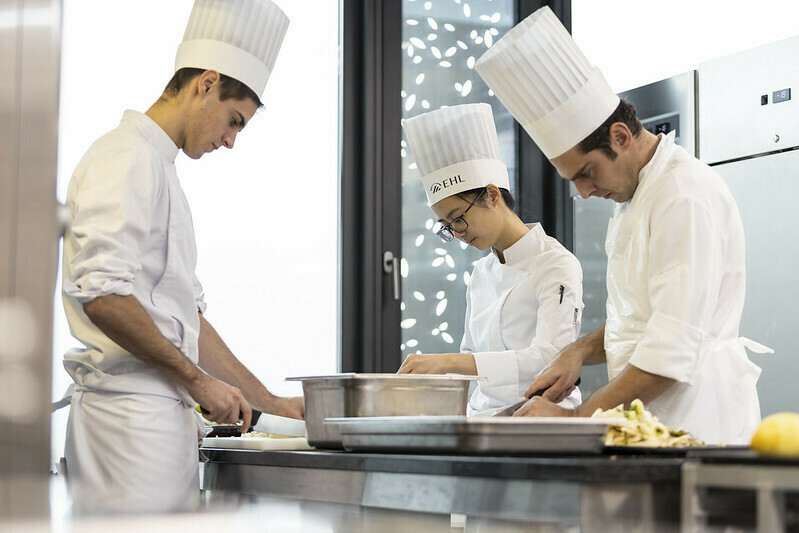
In the words of a graduate of the school
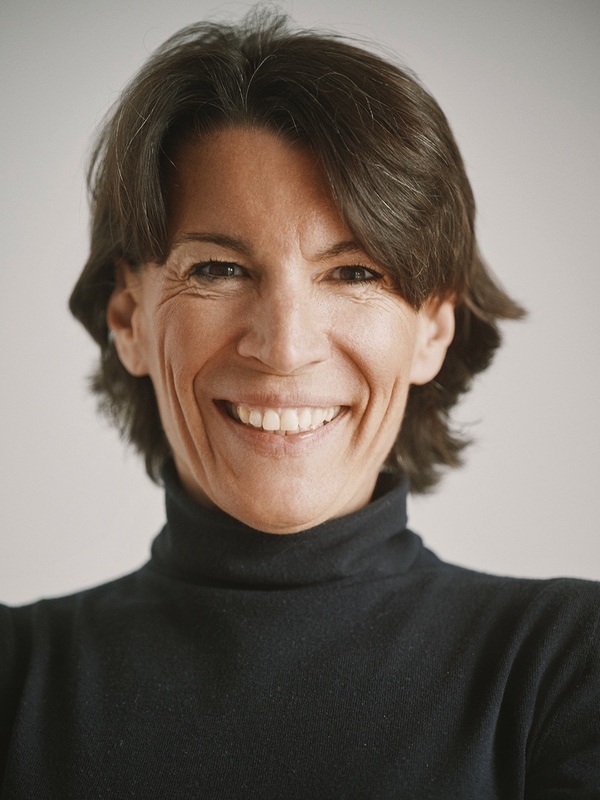
Sitting in one of the spacious and richly furnished salons of her own hotel, Nathalie Sailer-Hayez, who is elegant and exquisitely dressed while also very down-to-earth in her manner, has been manager of the luxury class Swiss hotel Beau Rivage Palace for the last seven years. Previously, she ran the Connaught in London for five years. She told us of her experience of studying at the school. ‘I am a happy graduate of the EHL’ she says. ‘I liked every moment of my study, and if I had to study there again, I’d happily go back straight away. It’s a fabulous school which maintains the balance between the academic and practical sides of life, and most importantly, when you finish your studies there, you’re completely ready to begin work. People from different countries study in that school, it really is international. If you work in a hotel, you have to be familiar with contrasting cultures. The students in the school really do work hard, they learn discipline but at the same time they also have a place in their lives for great parties’.
It’s impossible to understand how the hotel business works just by visiting hotels as a private guest. To be a manager, it’s essential to have a grasp of how all processes necessary to the functioning of a hotel are organised. For example, Nathalie is convinced that it’s crucial to spend more than a day or two in the kitchen in order to understand what problems can come up there. It is precisely these things which are taught at EHL. You don’t need to do hard physical labour for years, but it is nevertheless vital to know how it is done and why this work is so difficult. ‘I also had to wash the rooms, and I enjoyed it. In the first year when they come here, some students already have an academic background, but when they give them a knife and a chef’s uniform, some of them might not even know how to cut a carrot,’ says Nathalie enthusiastically. ‘And they learn how to do it. All of us, people from different backgrounds, learn together, and that puts us all on the same level. This allows us to forge a close-knit team. Together we have to go through various trials, such as cooking food for 500 people. At first, these challenges seem impossible, but then, through collective effort, everything works out, and you’re proud of yourself, your team, and your collective achievement. There have been many situations like that. Each guest acts differently and has different expectations, but thanks to these experiences, students learn how to serve each one the right way.
Before joining EHL, Nathalie went through a month’s training in each of the departments of the Beau Rivage hotel. The laundry was especially difficult as it was exhausting, monotonous work. But having seen how hard the staff worked, she understood how to motivate people. ‘I think I managed to create an atmosphere in which people could be themselves. It is easier to micromanage the team than to offer a disgruntled client a glass of champagne for each staff blunder. You can’t run a hotel with terror. It’s better to do too much, than too little. Of course, there have to be certain limits, but if you want the magic to happen you need to give people the opportunity to be themselves and express their opinions’ she explained.
Why is hospitality, which suffered so severely during the pandemic, still seen by many as a reliable sphere for forging a career, and a great first choice for many graduates from wealthy families? Nathalie’s answer to this question is comprehensive: ‘Many people view this sector from the wrong angle; for them, it’s all about serving Robert De Niro breakfast, or welcoming president Macron to his room, before receiving Obama, then celebrating Phill Collins’s wedding…when you work in the luxury segment of hospitality, it’s like theatre. On the one hand, you work on the strategic side, on the other, you have to be sure that they lay the knives on the right side of the plates. You head a team of over a hundred people and you have to use your knowledge in the spheres of architecture, marketing, finance and human resources… It’s very multifaceted and absorbing work. Hospitality is a wonderful industry which allows you to travel and live for extended periods in different countries and learn about different cultures, so you really can grow and discover yourself. After graduating, there were lots of opportunities for me. I found work straight away, and, since then, all my life, I’ve been able to do exactly the kind of work I want’.
What the guests say
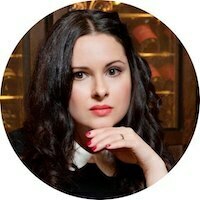
The head editor of Kommersant UK, Ksenia Dyakova-Tinoco spent two days at the Lausanne campus, during which she was able to attend several classes, and, most importantly, visit the famous Michelin-starred restaurant Berceau des Sens (Cradle of the Senses), where the students themselves work:
‘From my very first minute at the EHL, I was pleasantly surprised by the appearance of the students and the pristine state of the school building. From 7 in the morning until 9 in the evening, the young people follow a strict dress code. After London, where anything goes, I was surprised to see so many girls in stilettos and see-through tights and boys in shoes which had been polished to a shine. I went to one of the leading Moscow universities in the early 2000s and I still remember the philosophical graffiti on the lecture hall tables and the professions of love for lecturers in the toilet cubicles, so from the all-pervading ideal cleanliness and order, I knew that the students were not expressing themselves on the walls of the school.
My most memorable impression was watching timid and unsure first-year students of a cosmopolitan mix of nationalities working here and there in the cafeterias and restaurants of the campus, fulfilling a wide range of roles, from chefs to cleaners. The youngsters behaved very kindly and modestly, but the quality and taste of the food excited my senses. It was mostly beautifully served French and Japanese cuisine; separately I noted crispy freshly-baked bread. In the ‘Cradle of the Senses’, you can watch the drilling that students receive from strict teachers, recruited from among leading chefs and sommeliers. These instructors show the importance to service of detail, explaining how waiters should recommend wine and the right way to tilt a bottle when pouring, for instance. Despite their carefulness, of course incidents of spilt drinks and broken dishes did occur, sending the young students into paroxysms of horror, which was very affecting. The restaurant isn’t just visited by people from the campus; it is also patronised by diners from the outside world.
A seminar dedicated to cognac also stuck in my mind. They talked about the angels’ share and explained how to tell VSOP from XO. Right there, in the course of the class, the students were offered French brands which were not cheap. Once again, there was ideal discipline during the lesson, and they were not befuddled or dazed by the alcoholic fumes. You might suppose that the secret of this behaviour is the high price of study, yet it somehow seems that, instead, it’s thanks to the way the study process is organised. At EHL students obviously feel comfortable and their interest is engaged, so they don’t have time to become bored. On all floors, someone was studying, whether in the library, the tasting room, the kitchen or one of the restaurants. What’s more, they’ve told me that they can also work in the greenhouse, the vinothèque or the shop. It’s simply never boring here, although, inevitably, there are theoretical lessons in the format of lectures, which seem more familiar to people of my generation. They take notes here with the help of laptops.
One thing which bothers me slightly is that, after leaving the school, many graduates go into finance or banking. It seems to me that, after four years of study, it should be completely impossible not to fall in love with the restaurant business. Here, both haute cuisine and less refined dishes are served so sensually, and with such soul. But, I suppose, everyone chooses what is more to their taste’.
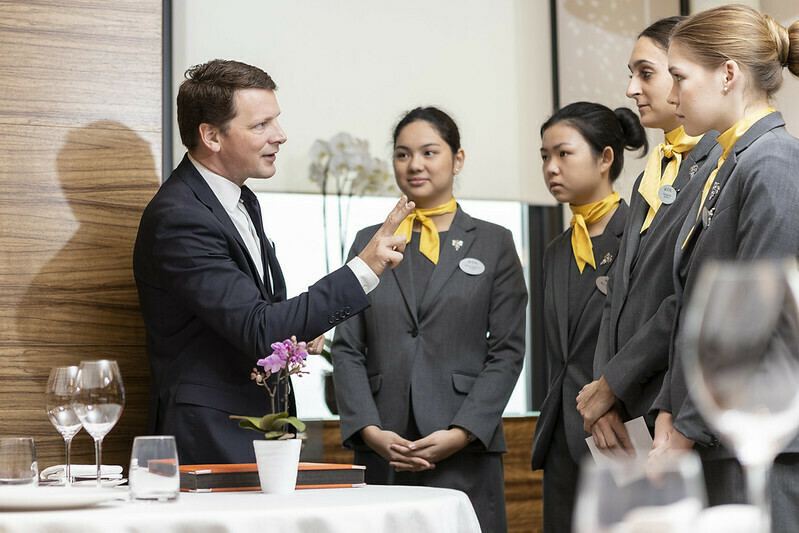
Some important milestones in the history of the EHL
In 2022, 213 Russians studied at EHL; only four fewer than in 2021. The cost of the school’s four-year baccalaureate programme for foreign students in 2023 is 177,000 Swiss Francs (£155,000). Accommodation is not included.
1893 The managing director of the Lausanne hotel Beau Rivage Palace, Jacques Tschumi, 1844–1912, founds the first school of the restaurant and hospitality business in the world, the Ecole hôtelière de Lausanne, (these days, the school is called the EHL Hospitality Business School). The first lesson, in which 27 male students took part, is held within the walls of the Hôtel d’Angleterre on the shores of lake Geneva.
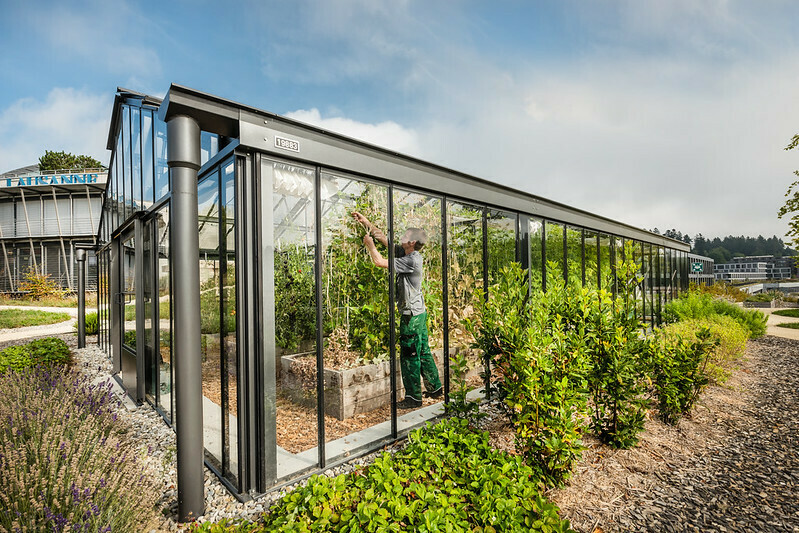
1912 The first four female students appear at the school.
1926 The EHL Alumni Association is founded. Amongst the first hundred members are the managers of top-rating hotels in Switzerland and beyond.
1943 Forced to close at the onset of war, the school opens its doors once more, thanks to a fundraising effort by its alumni. It offers special courses with a practical emphasis.
2003 The four-year baccalaureate is created.
2013 The EHL expands by acquiring the Swiss School of Tourism and Hospitality AG, (SSTH) in Passugg.
2021 EHL’s first international campus in Singapore opens.
2022 EHL Ecole hôtelière de Lausanne is renamed EHL Hospitality Business School. An innovative new campus in Lausanne opens with special dedicated zones, including an experimental kitchen. Today, students from over 120 countries study here.
EHL Hospitality Business School
https://www.ehl.edu/
YouTube
LinkedIn
Instagram
Welcome desk email: [email protected]


